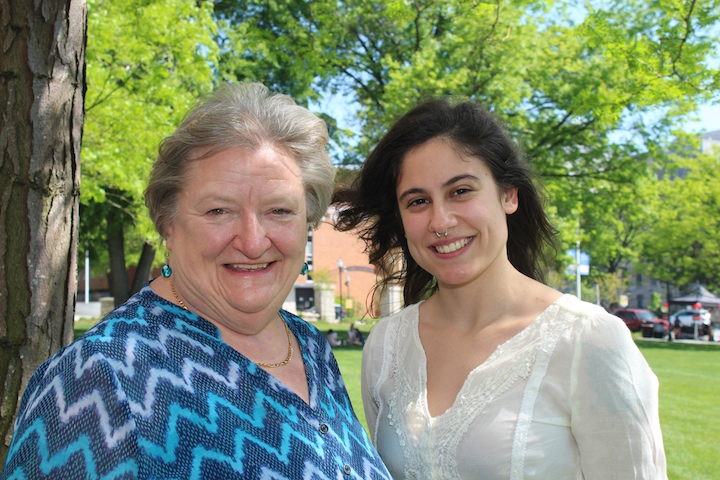University of Scranton Student Earns Fulbright Award

For soon-to-be University of Scranton graduate Albena Ivova Gesheva, the world is a vast highway full of opportunities available for the taking. So she plans to take full advantage of her next on-ramp, one that will take her to Germany as the recipient of a 2017-18 Fulbright Study/Research Grant.
Gesheva, a Scranton resident who was born in Pleven, Bulgaria, will conduct research on the effect of light intensity on echolocation behavior in tropical bats at the University of Ulm’s Institute of Evolutionary Ecology and Conservation Genomics. She will work under the supervision of research professor, Dr. Marco Tschapka.
In addition to research, Gesheva will also pursue another of her passions in Germany – the love of language. This weekend, she will graduate, cum laude, from The University of Scranton with an impressive list of accomplishments – a double major in neuroscience and philosophy, and as a member of both the University’s undergraduate Honors Program and the Special Jesuit Liberal Arts (SJLA) Honors Program. She also pursued minors in biochemistry and Japanese and a concentration in Asian Studies.
“I love language, and I think it is so indicative of a culture” explains Gesheva. “For example, in a any given vocabulary there are words in one language that just don’t exist in other languages. The words are indicative of a way of thinking – of values.” This passion for languages has led her to gain advanced language skills in Japanese, in addition to fluency in Bulgarian and English. She also speaks some Spanish and German. While in Germany, Gesheva plans to further develop and share her language skills by volunteering with the University of Ulm’s Refugee Support Office.
The Road to America
Gesheva came to America at the age of 7 with her mother, father and brother, none of whom spoke a word of English.
Her mother, a garment factory worker, and her father, a welder, left everything they had and knew in Bulgaria motivated solely by the hope of a providing a better life for their children. They were certain education provided the path to that life. Because of her parents’ firm convictions, Gesheva always knew she was going to college. “My parents believed that if you had an education, it would open up a lot of doors,” said Gesheva.
The family came to Scranton because a friend agreed to sponsor them while they looked for work. Ironically, both parents found employment at The University of Scranton.
“We were grateful for the opportunity to attend the University with tuition remission. It was an opportunity we couldn’t pass up,” said Gesheva. Her brother, Yavor Geshev, is a 2014 graduate of The University of Scranton, now pursing a medical degree at New York College of Podiatric Medicine.
Bridging the Roads as a Fulbright Student
The Fulbright Program is designed to increase mutual understanding between the people of the United States and the people of other countries.
“To me, the Fulbright program is not just bridging the culture between America and your host country, it’s bridging all cultures. It’s understanding each other on a very human level,” said Gesheva, who plans to reflect the best of America, Bulgaria, Japan and all the cultures she has encountered in her life.
“The highly-selective program is widely considered to be the premiere international educational exchange program sponsored by the U.S. government. Recipients are selected on the basis of academic achievement, as well as demonstrated leadership potential in their fields,” said Susan Trussler, Ph.D., the University’s Fulbright Program Advisor and associate professor of economics and finance. Since 1972, a total of 156 University students have been awarded grants in the competition, administered by the Institute of International Education, which includes Fulbrights. The primary funding source for the Fulbright Program is an annual appropriation made by the U.S. Congress to the U.S. Department of State, Bureau of Educational and Cultural Affairs.
The Research Intersection
While an undergraduate at Scranton, Gesheva participated in the Faculty-Student Research Program, working in the lab with faculty mentor, Patrick Orr, Ph.D., assistant professor of psychology, in human research studies. In addition, she conducted laboratory research at The Commonwealth Medical College, now Geisinger Commonwealth School of Medicine.
Gesheva has presented research posters at the 46th ORS (Orthopaedic Research Society) Musculoskeletal international workshop in 2016, the annual meeting of the Society for Neuroscience in 2015 and the meeting of the Eastern Psychological Association in 2015.
In 2016, Gesheva first began research work on bats in field studies as a summer intern with the Smithsonian Tropical Research Institute in Panama. Internships for this prestigious program are awarded to students based on merit and the institute matches the research interest of the student with ongoing research projects at the institute. The University works with the institute on a joint internship project supported by biology professors Marc Seid, Ph.D., and Gary Kwiecinski, Ph.D.
It was through her internship in Panama that Gesheva worked with a then master’s student, Gloria Glücksklee at the University of Ulm and learned of Dr. Tschapka’s research on bats.
Merging Research with Academics, Service and Medicine
On campus Gesheva was active in the Commuter Student Association and the Asian Club. She is a member of Phi Sigma Tau, the philosophy honor society and Alpha Alpha Sigma, the Asian studies honor societies, for which she served as co-president. She also volunteered regularly at Moses Taylor Hospital’s “Hospital Elder Life Program” (HELP).
Following her Fulbright year, Gesheva will pursue a doctor of medicine degree at Geisinger Commonwealth School of Medicine, after which she plans to work in a rural area.
Gesheva is a graduate of Scranton High School. She is the daughter of Sonya Gesheva and Ivo Geshev of Scranton.






